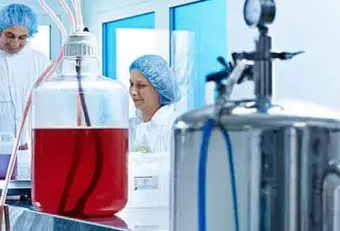Protamine sulfate API Manufacturers & Suppliers
Find, compare & contact
Filters
Custom request?
Type
Production region
Qualifications
Country of origin
Producer
Produced in:
Established in: 1980
MOQ: -
Employees: 30+

EU-GMP and DIN EN ISO 9001:2015

Pioneer in the fractionation of sheep plasma

Pure & sterile high-quality products
+ 0
All certificates
Producer
+ 0
All certificates
How does it work?
You can register for free as long as you are registering on behalf of a legal company related to the pharmaceutical industry
Search in the search bar the product that you’re looking for. We’ll show you an overview of all available suppliers. Use the filters to select the relevant suppliers only
Have you found interesting suppliers? Then it’s time to contact them. Use the send inquiry button and send them a message. You can send for each product, 3 inquiries per week
Suppliers get notified by Pharmaoffer that they’ve received a new inquiry. They will come back to you with their questions, certificates, and offer in the chat on Pharmaoffer. We will send you an email in case of any news
Does the supplier meet your quality and commercial requirements? Then you can place the order. Just follow the steps of our order module
Looking for Protamine sulfate API 9009-65-8?
- Description:
- Here you will find a list of producers, manufacturers and distributors of Protamine sulfate. You can filter on certificates such as GMP, FDA, CEP, Written Confirmation and more. Send inquiries for free and get in direct contact with the supplier of your choice.
- API | Excipient name:
- Protamine sulfate
- Cas Number:
- 9009-65-8
- DrugBank number:
- DB09141
- Unique Ingredient Identifier:
- 0DE9724IHC
About Protamine sulfate
Want to know more about Protamine sulfate? Since it's earliest discovery in salmon rine sperm heads in the late 1800's to its formal introduction via US FDA approval in 1939, protamine sulfate has occupied an important therapeutic niche as perhaps the only viable option for reversing the anticoagulant effect of heparin use for over 77 years Subsequently, because most invasive surgical procedures involve the routine use of heparin to prevent potentially surgery-complicating blood clotting, most cases of major bleeding in these frequent procedures are managed with the use of protamine sulfate The agent elicits this heparin reversal predominantly via the formation of an inactive complex between the anionic nature of heparin and its own cationic state Despite the relative importance of protamine sulfate's medical indication, the medication can notoriously cause a variety of potentially rare but genuinely severe adverse effects that include systemic hypotension, pulmonary hypertension, liver and kidney tissue damage, and anaphylactic reaction, amongst others.
More information such as the structure, indication or toxicity is available on Drugbank, click the ID above.
Protamine sulfate is a type of Hemostatics
Hemostatics, a subcategory of pharmaceutical active pharmaceutical ingredients (APIs), play a crucial role in promoting hemostasis, the process of blood clotting, to control bleeding. These essential medical substances are widely used in surgical procedures, trauma cases, and various medical conditions where excessive bleeding is a concern.
Hemostatics function by either promoting the aggregation of platelets or enhancing the coagulation cascade, thus facilitating clot formation and preventing blood loss. Several types of hemostatic agents are available, including topical agents, injectable agents, and absorbable sponges.
Topical hemostatic agents are commonly used in minor surgeries and dental procedures. These agents, such as oxidized regenerated cellulose and gelatin-based products, are applied directly to the bleeding site to induce clot formation and achieve hemostasis.
Injectable hemostatics, on the other hand, are administered intravenously or intramuscularly and work systemically to promote blood clotting. Examples of injectable hemostatics include recombinant factor VIIa and fibrinogen concentrates, which are employed in cases of severe bleeding or hemophilia.
Absorbable sponges, often made of gelatin or collagen, are frequently used in surgical procedures to control bleeding. These sponges absorb blood, swell, and create a physical barrier that supports clot formation.
Hemostatics have revolutionized medical practices by reducing blood loss during surgeries, improving patient outcomes, and minimizing the need for blood transfusions. They have become indispensable tools in various medical specialties, including cardiovascular surgery, orthopedics, and trauma care.
In conclusion, hemostatics are vital pharmaceutical APIs that promote hemostasis and prevent excessive bleeding. Their application in medical procedures ensures efficient clot formation and enhances patient safety.
Protamine sulfate (Hemostatics), classified under Central Nervous System Agents
Central Nervous System (CNS) Agents are a crucial category of pharmaceutical Active Pharmaceutical Ingredients (APIs) that specifically target the central nervous system. The CNS encompasses the brain and spinal cord, playing a vital role in regulating and controlling various bodily functions, including cognition, movement, emotions, and sensory perception. These agents are designed to interact with specific receptors, enzymes, or ion channels within the CNS to modulate neural activity and restore normal functioning.
CNS agents comprise a diverse range of pharmaceutical APIs, including analgesics, anesthetics, antipsychotics, sedatives, hypnotics, anti-epileptics, and antidepressants. Each subcategory addresses distinct neurological disorders and conditions. For instance, analgesics alleviate pain by targeting receptors in the brain and spinal cord, while antipsychotics are employed to manage psychosis symptoms in mental illnesses such as schizophrenia.
The development of CNS agents involves rigorous research, molecular modeling, and extensive clinical trials to ensure safety, efficacy, and specific target engagement. Pharmaceutical companies invest significant resources in identifying novel drug targets, synthesizing new compounds, and optimizing their pharmacological properties. These agents undergo rigorous regulatory evaluations and must adhere to stringent quality standards and guidelines.
Given the prevalence of CNS disorders globally, the market demand for effective CNS agents is substantial. The development of innovative CNS APIs not only improves patient outcomes but also provides valuable commercial opportunities for pharmaceutical companies. Continued advancements in CNS agent research and development hold the promise of groundbreaking therapies that can improve the quality of life for individuals affected by neurological conditions.
Protamine sulfate manufacturers | traders | suppliers
We have 2 companies offering Protamine sulfate produced in 0 different countries.
Get in contact with the supplier of your choice:
- Kraeber & Co GmbH from Germany, product country of origin Germany
- Yuki Gosei Kogyo from Japan, product country of origin Japan
Let the supplier know whether you are looking for a product with a specific monograph such as EP (Ph. Eur.), USP, JP, BP or another quality. Or, whether you are looking for hydrochloride (HCl), anhydricum, base, micronisatum or a specific purity.
You can use the filters to find high-quality suppliers. For example, you can select GMP, FDA or ISO certified suppliers. Visit our FAQ page or use the chat box in the corner to get more information about Pharmaoffer.










